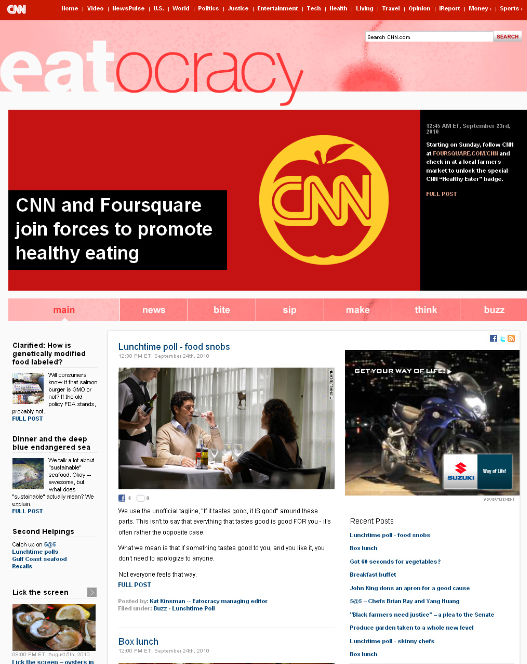CNN’s food blog Eatocracy has joined forces with the popular location-based social networking service Foursquare to launch a new healthy eating campaign. The concept is very simple: people are encouraged to check in local farmers markets to unlock special ‘Healthy Eater’ badges. The mix of emulation and status anxiety motivating most Foursquare users should expose them to nutritionally correct environments. It should also provide CNN journalists with something to talk about (I was gonna say ‘something to sink their teeth into’) for a week-long series dedicated to tomatoes and jovial shopkeepers.
If you detect a little sarcasm in my prose, it is not because of the unlabored definition of health that such intiative seems to promote. CNN might be perpetuating the stereotype that ‘healthy’ equates to ‘fruit and vegetables’. But, as far as social media are concerned, this is as good as it gets when it comes to health information campaigns.
The issue is the kind of social divide that ICT-intensive causes such as this (but also recent mobile health or Hacking 4 health applications, for that matter) are most likely to deepen. This divide is manifold in nature: firstly, it is a gap in terms of income and resources allowing some citizens to access technology-oriented services and excluding others – either for lack of skills or equipment. Here is where economic and cultural disparities turn into a technology-specific digital divide.
Foursquare is, from that point of view, a far cry from an egalitarian service. If compared to other social networking media, it demands the access to state-of-the-art smartphones, evolving computer skills, the chance of living in cool places, or enough money and time to travel to remote locations just to unlock fancy badges. All of these aren’t exactly prominent attributes of the urban poor, of the rural underprivileged and of the migrant populations – which are definitely those facing extreme health challenges (included nutritional ones).
Therefore, the very title of the project Eatocracy, ends up carrying a sinister resonance: the creation of a nutritional aristocracy commanding, via social networking, health information and services and de facto deepening already existing health inequalities. PS. ..and do not think that’s just a US thing: also here in Europe, concerns have been raised about the increasing ‘junk food divide’ between richer and poorer regions.
Addendum: Before putting this post online, I inquired on Twitter about who came up with the name Eatocracy. Kat Kinsman (managing editor of the CNN blog) answered me that she did, and that she actually meant something like “It’ll be a food democracy — an Eatocracy!”… oh well…

